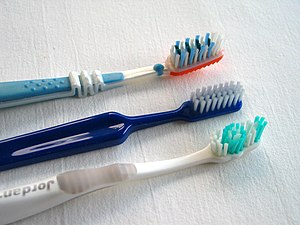 Image via Wikipedia I have a toddler, first grader, and fourth grader at home. How do I motivate them all to brush?
Image via Wikipedia I have a toddler, first grader, and fourth grader at home. How do I motivate them all to brush?Different age groups learn in different ways. Use the tips below to help your children and motivate them in their lifelong brushing & flossing habit.
Preschool
Preschoolers learn most things through rhythm and rhyme. Make the
brushing experience fun and exciting. Let them know there are little
bugs that we can’t see that live on their teeth, and you have to brush
them away. Make a song out of your teeth brushing time:
There’s a bug on my teeth brush him off
Brush up, brush down, brush you teeth round and round
When you spit the paste in the sink, the bug goes down the drain
There are no more bugs in our teeth Look smile now so bright
Once you have shown your tots the up and down and round and round flow
of brushing their teeth, give them the brush, “now you try. Once they
get the flow themselves and they move their tiny brushes correctly
make this a very exciting and joyous moment. Celebrate this with
laughter, clapping, and exciting hoorays. Let other family members in
on the celebration as well, have your child show their grandparents or
other family members how awesome they can brush their teeth.
Main points to address:
•Get excited about brushing and even more excited when they brush.
•Make it a fun experience.
•Ask them to show you how well they can brush their teeth.
•Make it a big deal to other family members when they learn how, “Dad
look how great (child’s name) can brush his/her teeth.
Grades K-3rd
Grades K-3rd learn through presentation and repetition. The best way
for young elementary children to learn is through repetition and
presentation. Offer your young children the ability to watch as you
brush your teeth explaining what you are doing every step of the way.
Use creative analogies, “plaque are small bugs in your mouth
eating away at your teeth and the only way to get them out is to
brush.”
You’ll be amazed at how quickly your kids will ask to brush their
teeth and insist on doing so regularly.
Main points to address:
•Be consistent with times of the day to brush.
•Use creative analogies or stories of others who never brushed their
teeth.
Grades 4th-6th
While grades 4th -6th learn through show and tell. There is nothing
more effective than honesty and showing these youngsters what happens
when someone doesn’t brush their teeth. Find pictures of an individual’s
teeth with serious decay or rotten teeth. Use every dental visit
as a way to teach them by asking the dentist for pictures of people
who never brush their teeth. Explain to them, “this is what happens
when people don’t brush their teeth.”
You can also explain the health hazards of not brushing your teeth.
There are plenty of health risks for individuals who don’t brush their
teeth.
Main points to address:
•Be honest about how not brushing decays their teeth and hurts their
health.
•Use pictures offered through your dentist at every visit.
•Ask your dentist to share with your children stories, pictures or
knowledge of the hazards of not brushing their teeth.
Remember....Learning is life long!
Dr. Cara



